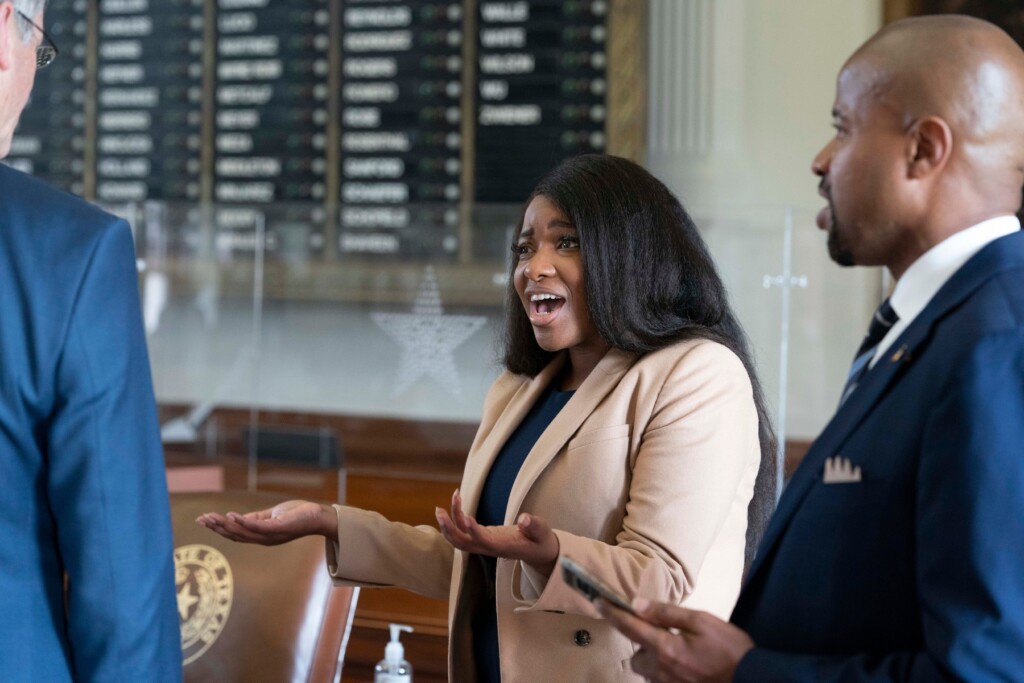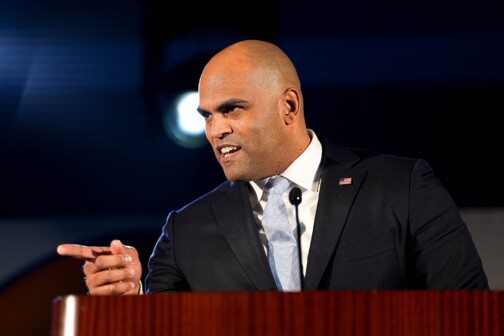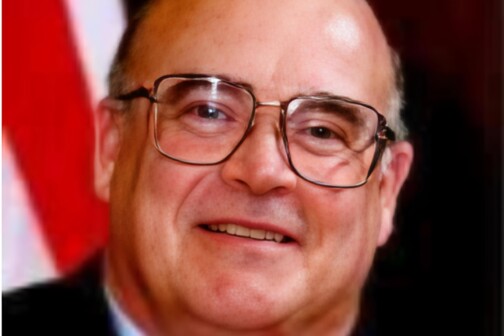Freshman U.S. Congresswoman Jasmine Crockett, D-Dallas, has learned a great deal in her first year in Washington, D.C., but perhaps one of the more painful lessons came within the first few months.
We planned to meet at her office one day in June, but a doctor’s appointment for an ongoing ear ailment had pushed back the conversation about her first dozen months at the Capitol. It turns out, what ailed Crockett was a foe doctors told her many freshman lawmakers face.
“I’ve been to the doctor three different times; we have doctors at the Capitol, with a whole pharmacy and everything,” she said. “They told me, ‘Oh, yeah, we see this especially with new members who start traveling more.’”
Crockett said she was used to flying every weekend as a state lawmaker, but those trips were 30 minutes. The three-hour flights back and forth to D.C. were another matter.
“It was getting to the point that literally my ear clogged up for, like, weeks at a time, and I could not hear,” she said. “So the last time I went to the doctors at the Capitol, they told me to see a specialist, because the only thing they could do was to give me steroids, and they’re like, ‘We cannot keep giving you steroids for this.’”
Crockett won her District 30 seat last year after longtime U.S. Rep. Eddie Bernice Johnson retired. Before that, she served as the state representative for much of the same area, making a mark as the only Black freshman and the youngest Black lawmaker in the 87th Texas legislative session.
She was one of the women leading the Democrats’ decision that session to walk out to prevent a vote on Senate Bill 7, a priority of Republican legislators that would tighten election laws in the state. Democrats argued that it restricted the voting rights for many, including people of color, the elderly, and the disabled.
Ear issues aside, Crockett has been busy in Washington. She has sponsored or co-sponsored 338 bills so far, which include legislation around voting rights, homelessness, and reproductive healthcare accessibility. She has also, yes, been on a lot of airplanes to return to her district to meet with constituents.
Back at the Capitol, she serves on the Committee on Agriculture and the Committee on Oversight and Accountability. It’s the latter that has frequently provided sound bites (that often go viral) of Crockett responding to fellow lawmakers, including Colorado’s Lauren Boebert, Georgia’s Marjorie Taylor Greene, and New York’s George Santos.
With all of that in mind, our conversation about her freshman year, edited for length and clarity, follows.
So I guess my first question is a bit loaded, but, how is the first year going?
(Laughs) Well, you’ve seen a little bit of how it’s going. But it’s super busy—a lot busier than even I anticipated. We’re kind of a team that’s hitting on all fronts sometimes. Sometimes a representative will have an office that’s really good at casework, or that’s really good at filing bills, or an office that’s really good at media. You’ll find different members that have a niche, and they settle into that and that’s what they focus on. And for me, it’s just a little different.
I think most people became familiar with me because of all the drama as it unfolded in the Texas House, and I ended up in the national news. There’s all these relationships that were born of that with (TV) booking agents and producers, and now they’re like, “Oh, you’re in Congress now? We’ll call you about everything.”
We’re doing the media part, but I’m such a community person that the whole reason I ever ran for office was because I felt like I wasn’t doing enough as an attorney. I wanted to make a bigger impact. I’m such a community person that I’ve forced my office to be that way. I want to show up. I want to be at all the events. I want us to host our own events. To me it’s just a big part of what it is to be a public servant.

Did you always know you wanted to be a legislator?
I’m a lawyer, and lawyering is what made me want to write legislation. I remember when I first announced for the Texas House, we did a surprise announcement, and everybody just knew I was gonna announce for judge, because Dallas has a historic number of Black women that sit on the bench. I love to try cases. Everyone thought I was going to run for judge, and it was just a matter of what I was running for. But no, I want to write the laws and make $7,000 a year. (Laughs) I love it.
I told my team in D.C. to try to give me a little more time in committee, because I actually do like to sit there. I like to listen.
What surprised you about the attention your discussions in committee in D.C. have attracted?
What’s been the most surprising about the committee work is how many people pay attention—everyday people—and they’re commenting on TikTok or Twitter or wherever. Like, that was no one ever in Texas. With my committee work in Texas, and I had some really good committee work, you never saw it. Maybe some floor work would get clipped in Texas. But this is really new to me.
That committee work is where you’ve had exchanges that go viral, like that exchange with Lauren Boebert from earlier this month.
It’s been interesting when people ask me about it, because we’ve gone viral continually, which is really weird. And the day that happened, people were asking me, ‘So did you know?’ and no, we didn’t. We had five minutes, we’re sitting there, and the room is not really the fullest, and then you go on to your next meeting and you have no idea.
That Boebert exchange was the same day that we were having the congressional baseball game, and I was worried about whether or not I would get to play because I rolled my ankle, and it was such a busy day. We had to get to the stadium really early, so it literally wasn’t until I was sitting in the dugout eating popcorn, and I clicked on my Twitter and was like, ‘Oh, let’s see what’s going on,’ and I had been tagged in some video, and it’s trending fast. Then we play the game, and it really wasn’t until the next day when I realized, ‘Oh, yeah, I guess this is kind of everywhere.’
We were told as freshmen in the state house that we were to be seen and not heard, and that was during orientation.
So you got a taste for lawmaking in the Texas House, but what about your time there prepared you for Congress—especially the personalities?
I think getting a good understanding of how performative the other side is. I think there’s a lot of people that don’t realize that legitimately, there are people who are acting. They don’t even believe the things they’re saying. I walked into the state house thinking that anything that was crazy that was said was because literally, that person was crazy. But instead, it’s like half of them are and the other half are just trying to do whatever it takes to keep their seats.
I think understanding that dynamic has allowed me to better identify, ‘All right, I can work with this one because they’re basically a performative Republican.’ That doesn’t make it better that they’re taking terrible votes and whatever and they say whatever, but I can actually find some middle ground to work with them on certain stuff.
I think being in the state house also helped me to not hold back. I was caught off-guard as a freshman in the state House. I was aghast at some of the things they were doing and heard, and legitimately offended.
We were told as freshmen in the state house that we were to be seen and not heard, and that was during orientation. And my natural reaction to certain stuff is so visceral that it just wasn’t a thing for me. But I also learned that even though a lot of people on the other side may disagree with me, they respected the fact that when I spoke up, it was real, it wasn’t performative. I spoke with conviction and I spoke from a level of experience.
So in the U.S. House, I don’t need to go cower in a corner because I’m a freshman if I really feel like there’s a fight to be waged.
Tell me about District 30. What are your constituents looking for you to help them with?
It’s economics, and honestly, that’s every district in this country. Economics is kind of an overarching big umbrella. But to be more granular, my district has the highest level of incarceration in the state of Texas. I also have a poverty level that is at or below 20 percent—I think the official numbers we see online is 16 percent, but I know how the undercounts go, so I round up.
We have such a high level of unhoused people. We’ve got food deserts. We’ve got the healthcare deserts. We’ve got all those things in my district. So when I say economics, I mean it on a whole other level and I also mean it to be something more significant than, ‘Oh, I sit on the Ag Committee and I’m obviously fighting for SNAP benefits.’ SNAP is paying $6 a day per person. That’s it for food. But I’m not fighting to leave people on SNAP benefits forever, because I would rather they do have good paying jobs, savings, health benefits, and I would rather reduce my poverty number. I would rather pull people out of poverty.
I’ve spent a lot of time trying to familiarize myself with the corporations in my district. We have a lot of opportunities. We’re an energy leader. We do tons of trade out of Texas. We’re also an agricultural leader. So how do we connect people to those opportunities? How do we make sure they are preserved for the people that are here?
Is it hard in the current Congress to do that?
What I’ve told some people is this is supposed to be the people’s House, but it feels more like the animal house a lot of times walking the halls of Congress. So I don’t necessarily have a group of people that I really feel can look at the human struggle and recognize that struggle exists in my district. It’s also a very prevalent struggle that exists—even in many of their very rural districts—and we could really work together for something that will truly better the lives of their constituents as well as my constituents.
Author







